Poker Legislation: The Legality of Gambling in Every U.S. State
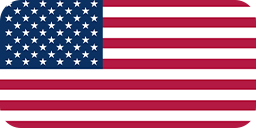
Poker occupies a unique place in American culture. This game is enjoyed by millions of people all over the country. Live poker has more freedom in the legal field, as many states allow poker. However, online poker is encountering significantly more resistance. The legal landscape differs greatly from state to state. Below we will look at the status of live poker and online poker in America and analyze potential changes in the future.
Where is online poker legal in the US, and where can you play without breaking the law? Check out our interactive map to learn about recent changes in the world of online poker.
Table of Contents
Live Poker Legislation
Is live poker legal in the US? Live poker is available to a large number of players from the USA. In most states, it is allowed in licensed casinos or online poker rooms. For example, it is a very popular type of leisure activity in states such as Nevada and New Jersey. The opportunity to join legal poker tables is available in Florida, California and other similar states. However, some states have restrictions that exclude the possibility of joining poker tournaments. In most states, users must be at least 21 years old to play.
Online Poker Legislation
Online poker faces more difficulties than live poker due to federal laws such as the Wire Act and UIGEA. These laws restrict the ability to play for real money and transfer funds for this purpose. As a result, only a few states have legalized poker online on their territory. Players can access regulated platforms in states such as Nevada, New Jersey, Pennsylvania, and others. Other states are still debating whether to legalize poker online.
Sweepstakes Poker Legislation
Sweepstakes poker is a popular alternative in states where real-money online poker isn’t regulated. Instead of wagering cash, players use two types of virtual credits: “Gold Coins” and “Sweepstakes Coins.” Gold Coins are purchased, but Sweepstakes Coins are given away for free or as bonuses alongside them. Players cannot directly buy Sweepstakes Coins—with no cash-cash exchange, it operates outside gambling definitions.
This model mirrors traditional sweepstakes—games where prizes are awarded based on chance without requiring a purchase—which are legal in the U.S. under the “no purchase necessary” rule . Platforms like ClubWPT, GlobalPoker, and Stake.US use this structure: players buy Gold Coins to play and receive accompanying Sweepstakes Coins, which can be redeemed for cash prizes.
By separating virtual currency from actual money betting, these sites comply with state laws and let enthusiasts enjoy poker-style games legally in most unregulated jurisdictions.
States in the US With Legal Online Poker
As mentioned earlier, there are states where online poker is legalized. In addition, we are seeing a gradual process of combining the states that have legalized online poker into a shared player pool, where players can compete against each other. This pool is called the Multi-State Internet Gaming Agreement, or MSIGA.
What is MSIGA?
The Multi-State Internet Gaming Agreement (MSIGA) is an interstate compact that allows licensed online poker platforms to merge their player pools across participating states—currently Nevada, Delaware, New Jersey, Michigan, West Virginia, and Pennsylvania. To join, each state must first legalize online poker under compatible regulations and then formally sign onto the agreement. Since its initial launch between Nevada and Delaware in 2014, MSIGA has expanded steadily, with Pennsylvania becoming the sixth member in 2025.
| State | Join Date |
|---|---|
| Delaware | 2014 |
| Nevada | 2014 |
| New Jersey | 2017 |
| Michigan | 2022 |
| West Virginia | 2023 |
| Pennsylvania | 2025 |
Connecticut
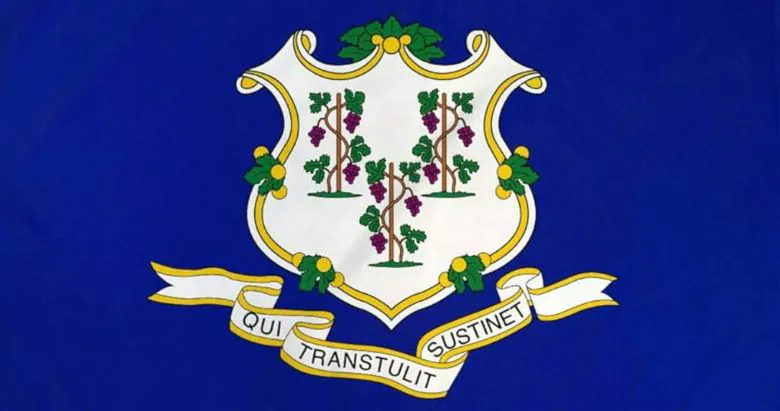
Connecticut has become one of the last states to legalize online poker. In May 2021, a law was signed allowing the Mashantucket Pequot and Mohegan Tribes, the operators of the Foxwoods Resort and Mohegan Sun casinos, respectively, to offer online poker along with sports betting and casino games.
To be precise, online poker Bill 6451 was signed on May 27, 2021. Prior to that, only live poker had been available in the state since 1992. The Connecticut Department of Consumer Protection oversees the regulation of online poker. Thus, while in this state, users can access both online poker and live poker tables. This move has significantly increased the size of tournaments and the liquidity of cash games, making Connecticut an attractive market for both operators and players. The State of Connecticut has successfully created a regulated environment that prioritizes player protection while contributing to the growth of the online poker industry.As of 2025, no major online poker brand (like PokerStars, WSOP, or BetMGM) are licensed to operate in Connecticut by the Connecticut Department of Consumer Protection (DCP).
Delaware
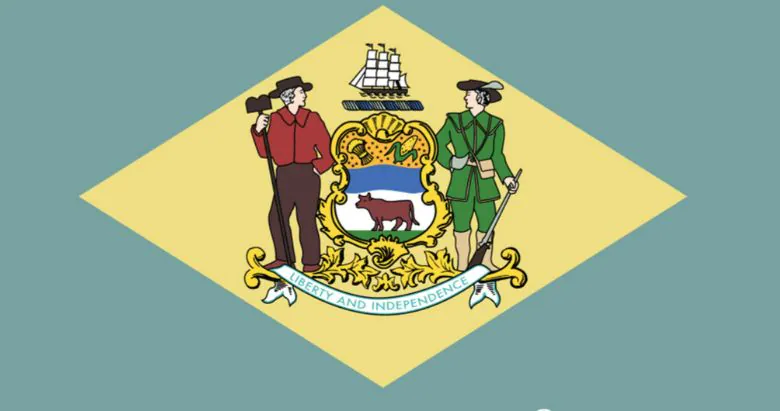
Delaware was one of the first states to legalize online poker, doing so in June 2013. Since then, all players over the age of 21 have been able to join online tables. Alongside online poker, live poker is also available. All regulated online poker in Delaware is provided through three local casinos — Delaware Park, Dover Downs, and Harrington Raceway — which now operate on the BetRivers platform. These sites share a player pool thanks to Delaware’s partnership agreement with Nevada and New Jersey, allowing for larger tournaments and more active games. Online poker in Delaware is regulated by the Delaware Lottery.
Michigan
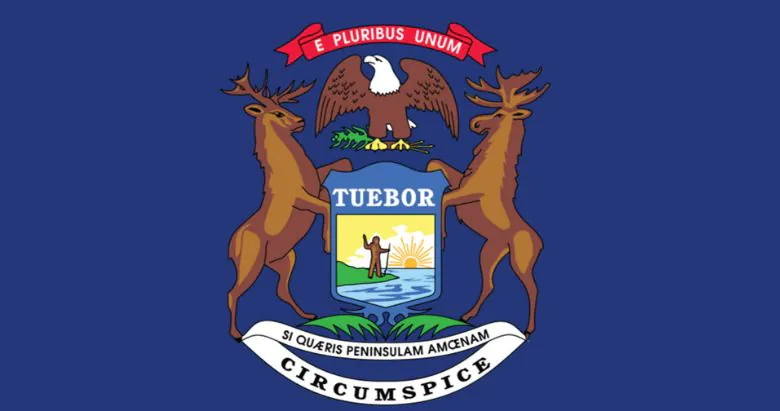
Live poker has been allowed in Michigan since way back in 1999. But what about online poker? Online poker has been legal in Michigan since December 2019. In 2021, the first site where users could access online poker started operating in the territory. This platform is PokerStars. It is also one of the most popular among local users. BetMGM is also on staff. All poker fans can participate in events of WSOP.com. All these poker rooms are licensed by the Michigan Gaming Control Board (MGCB). Players must be at least 21 years old to play. Thus, this state has created and is developing a framework for regulating online poker and maintaining security for local users. Now they don’t have to resort to offshore sites.
The following poker rooms are licensed to operate online poker in Michigan by the Michigan Gaming Control Board:
| Brand | Local Casino | Tribe |
|---|---|---|
| BetMGM Poker | MGM Grand Detroit | N/A |
| PokerStars | Odawa Casinos | Little Traverse Bay Bands of Odawa Indians |
| WSOP | Turtle Creek Casino & Hotel | Grand Traverse Band of Ottawa and Chippewa Indians |
Nevada

In Nevada, one of the first states with legal online poker, a good base for the safety of players has been created. In 2013, Bill AB114 was adopted. The Bill made it possible to legally allow online poker in Nevada to anyone who has already reached the age of 21. Moreover, live poker is also available in the state. The largest platform for local players is WSOP.com (World Series of Poker), which is licensed by the Nevada Gaming Control Board (NGCB). Here you can find many prestigious tournaments and develop your skills. Nevada played a pivotal role in shaping the future of online poker by spearheading the Multi-State Internet Gaming Agreement (MSIGA).
The following poker rooms are licensed to operate online poker in Nevada by the Nevada Gaming Control Board:
| Licensee | Number |
|---|---|
| Real Gaming (South Point Poker LLC) | 31714-01 |
| WSOP – World Series of Poker | 35445-01 |
New Jersey
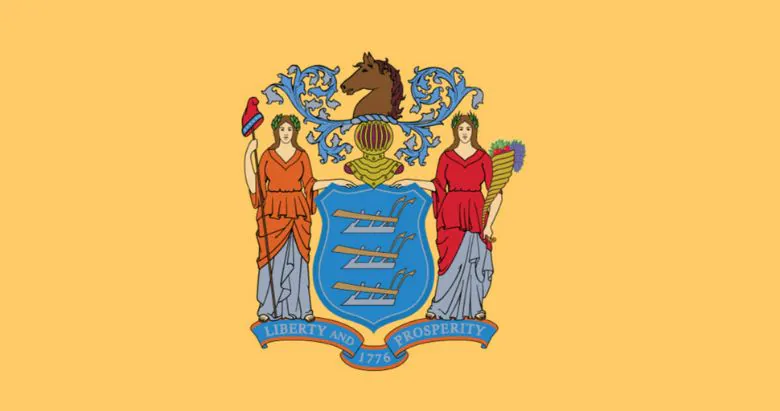
New Jersey has one of the most developed poker markets. Back in 1978, the first casino opened in the state after the adoption of the New Jersey Casino Control Act in 1977. The state authorities followed Nevada’s example by legalizing online poker in New Jersey in February 2013. So, Assembly Bill 2578 was signed. The New Jersey Division of Gaming Enforcement (DGE) is monitoring the market. This state has also joined the MSIGA, thereby expanding the boundaries of online poker. Today, there are the most online platforms represented here. So, PokerStars NJ, BetMGM Poker NJ, WSOP.com NJ, Borgata Poker NJ, and partypoker NJ are available to players. To be able to play, you must be 21 years old.
The following poker rooms are licensed to operate online poker in New Jersey by The New Jersey Division of Gaming Enforcement:
| Brand | Name | Permit Number | Local Casino |
|---|---|---|---|
| PokerStars | DGMB Casino, LLC | NJIGP 25-008 | Resorts Casino Hotel Atlantic City |
| BetMGM | MGM Sports & Interactive Gaming | Borgata Hotel Casino & Spa | |
| WSOP | Caesars Interactive Entertainment | NJIGP 25-007, NJIGP 25-012, NJIGP 25-013 | Tropicana Atlantic City |
| Borgata Poker | Borgata Hotel Casino & Spa | NJIGP 25-001 | Borgata Hotel Casino & Spa |
| partypoker | ElectraWorks Limited | Borgata Hotel Casino & Spa |
Pennsylvania
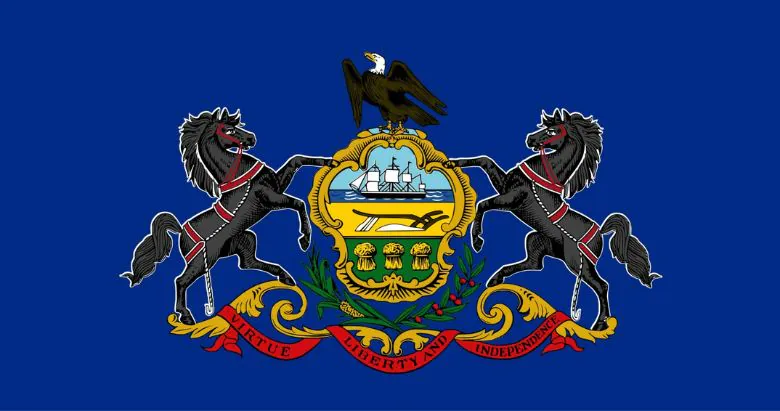
Pennsylvania legalized online poker in October 2017. This happened after the adoption of the HB 271 Bill. The first platforms were launched in November 2019. Live poker is also allowed in the state according to Senate Bill 711, which was passed in 2010. The Pennsylvania Gaming Control Board (PGCB) oversees the regulation of online poker. It enforces strict standards of player protection, responsible gaming, and financial transparency.
As one of the most populous states in the United States, Pennsylvania has provided significant liquidity to the regulated online poker market. Major operators such as PokerStars, BetMGM and WSOP.com quickly gained their presence. They currently offer a wide range of cash games and tournaments. Pennsylvania joined the Multi-State Internet Gaming Agreement (MSIGA) in 2025.
Online poker has been legal in Pennsylvania since October 2017. The following poker rooms are licensed by the Pennsylvania Gaming Control Board.
| Brand | Certificate Holder | Gaming Operator | Commencement date of operations |
|---|---|---|---|
| WSOP | Chester Downs and Marina, LLC d/b/a Harrah’s Philadelphia Casino and Racetrack | July 15, 2021 | |
| PokerStars | Mount Airy #1, LLC d/b/a Mount Airy Casino Resort | TSG Interactive Services US Limited d/b/a The Stars Group | |
| DraftKings | Mountainview Thoroughbred Racing Association, LLC d/b/a Hollywood Casino at Penn National Race Course | Crown PA Gaming, Inc., d/b/a DraftKings | October 17, 2024 |
| BetMGM | Mountainview Thoroughbred Racing Association, LLC d/b/a Hollywood Casino at Penn National Race Course | BetMGM, LLC d/b/a BetMGM | April 29, 2021 |
| BetRivers | SugarHouse HSP Gaming, LP d/b/a Rivers Casino Philadelphia | Rush Street Interactive PA, LLC | September 17, 2024 |
| Borgata Poker | SugarHouse HSP Gaming, LP d/b/a Rivers Casino Philadelphia | BetMGM, LLC d/b/a BetMGM | April 29, 2021 |
Rhode Island

Currently, the last state to legalize online poker is Rhode Island. This happened here after the adoption of the H 6348 Bill in 2023. Given the small population, Rhode Island faces difficulties in maintaining a stable number of players. Also, the very recent creation of the legalization ground has not yet led to numerous sites where users could play. The state is still on its way to create a base for online poker and develop its popularity. Nevertheless, lawmakers hope that joining interstate agreements such as the MSIGA will also help solve this problem. Until then, Rhode Island remains focused on providing a safe and regulated environment for its residents to play online poker. The introduction of online poker in Rhode Island reflects a broader trend among smaller states to legalize this type of leisure activity.Online poker has been legal in Rhode Island since December 2023. As of 2025, Bally’s is the only licensed provider of online poker in the state, authorized by the Rhode Island Lottery, but there is no online poker room.
West Virginia
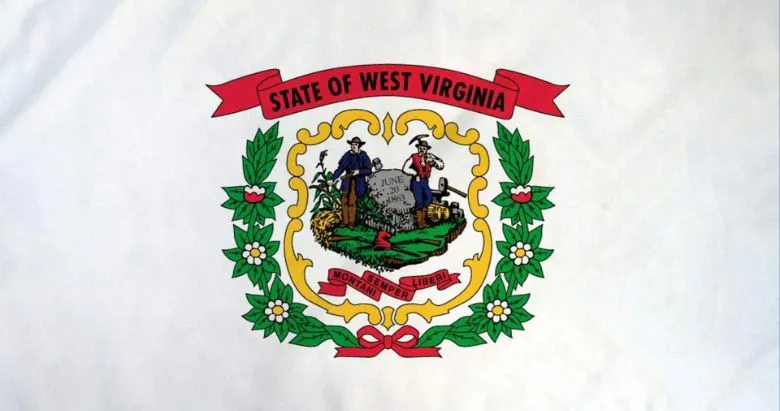
Gamblers can play online poker in West Virginia since March 2019. Then House Bill 2934 was passed. Along with this, live poker has been allowed in the state since 2007. Due to the relatively recent introduction of regulation, the online poker market is currently stabilizing and is on its way to becoming profitable. It is quite possible that in 2025 there will be more platforms in this state that will offer online poker services to local players. Although the state has not yet joined any interstate agreements such as MSIGA, there is potential for cooperation in the future.As of 2025, BetRivers is the only online poker platform licensed by the West Virginia Lottery to operate in the state.
Legality of Poker & Gambling in Other States
The legal status of poker and online gambling in the United States varies significantly. Each state has its own rules and regulations. For example, in some places only live poker is available, and in others gambling is generally prohibited. The current situation in each state regarding the legalization of poker is presented below.
Alabama
Is online poker legal in Alabama? — No. Alabama is a state with a fairly strict attitude towards poker and online gaming in general. Online and live poker, betting and online casinos are prohibited here. Despite periodic discussions about the possibility of introducing regulation, no significant legislative measures have been taken to legalize poker or other casino games. However, sweepstakes poker is available as a legal alternative. Alabama has several casinos operated by the Poarch Band of Creek Indians (Wind Creek Atmore, Wetumpka, Montgomery), but none of them offer live poker or table games.
Alaska
Is online poker legal in Alaska? – No. Alaska has an extremely conservative approach to gambling. All forms of betting are prohibited, including live and online poker. The 2016 Alaska Gaming Reform Act allowed only charitable gaming such as lotteries, bingo, and prize draws. Traditional online poker remains illegal, and there are no legislative efforts to change this situation. However, sweepstakes poker is allowed due to a separate regulatory framework. Visitors can also try live poker at Klawock Casino or casinos aboard Alaskan cruises.
Arizona
Is online poker legal in Arizona? – No. However, live poker is allowed in tribal casinos such as Talking Stick Resort, Casino Arizona, and Desert Diamond Casino. Online poker remains unregulated, but sweepstakes poker is available as a legal alternative. Sports betting was legalized in 2021, and further changes in online poker regulation may follow.
Arkansas
Is online poker legal in Arkansas? – No. Today, Arkansas players do not have the opportunity to play online poker. Local legislation does not allow this. However, there has been little progress in gambling since 2019. The fact is that a referendum was held, as a result of which racetracks transformed their activities. After that, it became possible to play online slots and table games at Southland Casino Racing and Oaklawn Racing Casino Resort. Unfortunately, residents who want to play online poker cannot meet their needs yet. Sweepstakes poker is available as a legal alternative for players aged 21 and older. For live gambling, Arkansas allows casino games at Southland Casino Racing and Oaklawn Racing Casino Resort, but live poker rooms are not currently available. Gambling winnings are subject to 5.5% state tax and federal tax.
California
Is online poker legal in California? – No. California is one of the largest live poker markets in the United States. However, online poker remains unregulated, despite numerous attempts to pass legislation. At the moment, it is not possible to resolve several issues, the key of which is the problem of income distribution in the state from online gambling. Currently, players can only play live poker in land-based establishments. Sweepstakes poker is available online for residents 18 and older. California is home to more than 60 legal cardrooms, including Commerce Casino, Bicycle Casino, and Bay 101. Gambling winnings are subject to federal tax, but there is no state income tax on gambling winnings.
Colorado
Is online poker legal in Colorado? – No. This state is quite progressive, as evidenced by the recent approval of sports betting in 2019. Live poker is also available here at local casinos located in major cities. Attempts to regulate online poker have faced obstacles. Sweepstakes poker is available online for residents 21 and older. Popular poker rooms include Ameristar Black Hawk, Golden Gates Casino, and Isle Casino Hotel Black Hawk. Gambling winnings are subject to a 4% state tax, in addition to federal taxes.
Florida
Is online poker legal in Florida? – No. Florida offers live poker throughout the state. It is possible to play at verified and licensed land-based casinos. Online poker, however, remains illegal despite attempts to introduce legislation. Players must be 18 or 21 depending on the venue. Sweepstakes poker is available online. Major live poker rooms include Seminole Hard Rock Hollywood, Bestbet Jacksonville, and Orange City Racing & Card Club. Gambling winnings are only subject to federal tax, as Florida has no state income tax.
Georgia
Is online poker legal in Georgia? – No. Georgia’s gambling laws are very strict and only allow charity games such as lotteries and bingo. Live poker is prohibited in casinos or card rooms, and online poker is also illegal. The only legal gambling option is the state lottery. Sweepstakes poker is technically available online, but there are no legal live poker venues. The minimum age for legal gambling is 18. All gambling winnings are subject to federal tax, as Georgia does not have a state tax on gambling income.
Hawaii
Is online poker legal in Hawaii? – No. Hawaii is one of the few states where all forms of gambling, including online poker, casinos, card rooms, sports betting, and lotteries, are completely banned. Lawmakers have consistently opposed legalization due to cultural values and concerns about addiction. There are no land-based casinos or poker rooms, and even sweepstakes poker is not clearly regulated, leaving residents without any legal way to play poker. The minimum gambling age is 18, but with no legal options available, all gambling winnings would only be subject to federal tax if applicable.
Idaho
Is online poker legal in Idaho? – No. Idaho’s gambling laws are among the strictest in the country. Only charitable lotteries and bingo are permitted. Both online and live poker are prohibited, and there are no licensed casinos or poker rooms operating in the state. Sweepstakes poker is also not regulated in Idaho. Residents are unable to access any legal poker options, and there are no ongoing legislative efforts to change this. Gambling winnings are subject to a 6.925% state tax in addition to federal taxes.
Illinois
Is online poker legal in Illinois? – No. Today, professional poker players cannot play online poker in the state. Lottery and horse racing betting are available forms of gambling. The legislators expressed their willingness to study the issue of online poker regulation. There have been previous attempts to create the Internet Gaming Act (IGA), but they have not been successful. At the beginning of 2025, a bill was again put forward with such an initiative, proposing a regulated online casino market for users over 21. Sweepstakes-based sites operate within state law. Live poker is permitted at licensed casinos such as Rivers Casino and Grand Victoria Casino. Gambling winnings are subject to a 4.95% state tax, plus federal taxes.
Indiana
Is online poker legal in Indiana? – No. Only live poker is allowed in casinos in the state of Indiana. These establishments offer a variety of table games, including poker. However, online poker is prohibited, and there has not been much progress toward legalization. Indiana legalized sports betting in 2019, with betting available at casinos, horse tracks, and off-track betting parlors. Sweepstakes poker is also available as a legal option. Players can visit casinos like Horseshoe Hammond, Ameristar East Chicago, and Hollywood Casino Lawrenceburg for live poker. Gambling winnings are subject to a 3.23% state tax in addition to federal taxes.
Iowa
Is online poker legal in Iowa? – No. Iowa casinos located throughout the state offer live poker. Online poker, however, is prohibited. Lawmakers have shown interest in regulating online poker several times, but these efforts have not succeeded. Sweepstakes poker is available for Iowa residents. Players can visit casinos such as Prairie Meadows, Horseshoe Council Bluffs, and Riverside Casino for live poker games. The minimum gambling age is 21, and gambling winnings are taxed at the state rate of 5%.
Kansas
Is online poker legal in Kansas? – No. In Kansas, only live poker is allowed in local casinos. These establishments offer a wide range of slots and table games, including poker. Online poker remains illegal in the state. Players can use sweepstakes poker, which operates under a different legal framework. Major casinos where live poker is offered include Hollywood Casino at Kansas Speedway and Kansas Star Casino. The minimum age to gamble is 21, and gambling winnings are subject to a 5% state tax.
Kentucky
Is online poker legal in Kentucky? – No. Only the state lottery and racinos are available in Kentucky. Online poker is illegal, and there have been no serious legislative efforts to change this. Live poker rooms are also not permitted, so residents cannot legally play poker in any form. Sweepstakes poker is available as a legal online option. The minimum gambling age is 18 for the lottery and 21 for racinos. Kentucky applies a 6% state tax to gambling winnings.
Louisiana
Is online poker legal in Louisiana? – No. Only live poker is allowed in Louisiana casinos located in major cities such as New Orleans, Baton Rouge, and Shreveport. These establishments offer a variety of table games, and poker is especially popular among locals. Online poker remains illegal, despite several attempts to legalize it since 2014. Sweepstakes poker is available online. The minimum gambling age is 21. Gambling winnings in Louisiana are subject to a 5% state tax in addition to federal taxes.
Maine
Is online poker legal in Maine? – No. The laws of the Maine state on gambling are quite strict. There are only a few live casinos here, such as Oxford Casino and Hollywood Casino Bangor, where players can find live poker. Online poker is not available to residents. The only legitimate options are lottery and bingo. Sweepstakes poker is available as an alternative for online play. The minimum gambling age is 21, and gambling winnings are subject to both federal and state taxes (5%). At the moment, there are no serious efforts to legalize online poker.
Maryland
Is online poker legal in Maryland? – No. Only live poker is allowed in Maryland casinos such as Maryland Live! Casino, MGM National Harbor, and Horseshoe Casino Baltimore. Sports betting and lotteries are also available to local residents. Online poker is not regulated, and there are no official casino sites offering online poker in the state. Sweepstakes poker provides a legal online alternative for players. The minimum gambling age is 21, and gambling winnings are subject to both state (8.75%) and federal taxes.
Massachusetts
Is online poker legal in Massachusetts? – No. Residents of Massachusetts can play live poker at casinos like Encore Boston Harbor and MGM Springfield. Online poker remains illegal and unregulated in the state, and there are no active legislative efforts to change this. Sweepstakes poker is a legal way for players to play poker online. The minimum gambling age is 21, and winnings are subject to state tax at 5%.
Minnesota
Is online poker legal in Minnesota? – No. Minnesota is home to many tribal casinos where live poker is available, including Canterbury Park and Running Aces Casino. However, online poker is not regulated or legalized, and previous legislative attempts have failed. Sweepstakes poker remains the only legal way to play online. The legal gambling age for casinos is 18 or 21 depending on the establishment, and gambling winnings are subject to a 7.25% state tax.
Mississippi
Is online poker legal in Mississippi? – No. Mississippi allows poker only in local casinos, such as Beau Rivage Resort & Casino and Horseshoe Tunica. Online poker is not regulated or available under state law. While sports betting is legal in person at casinos, there has been no successful effort to legalize online poker. Sweepstakes poker offers an alternative for online play. The legal gambling age is 21, and gambling winnings are subject to a 3% state tax.
Missouri
Is online poker legal in Missouri? – No. In Missouri, live poker is allowed at riverboat casinos such as Ameristar Casino St. Charles and Hollywood Casino St. Louis. These casinos offer a variety of table games, including poker, but online poker remains illegal and there are no regulated online poker sites. Sports betting is also not legal in Missouri. Sweepstakes poker is available as an alternative for online play. The minimum gambling age is 21, and gambling winnings are subject to a 4% state tax.
Montana
Is online poker legal in Montana? – No. In Montana, live poker is available in small casinos and bars across the state, including venues in cities like Billings and Missoula. Montana is unique for allowing certain forms of gambling outside of traditional casinos, so poker can often be found in local bars. However, online poker is prohibited and there have been no recent legislative efforts to change this. Sweepstakes poker is an available alternative for online play. The minimum gambling age for most games is 18, and gambling winnings are subject to both state (6.9%) and federal taxes.
Nebraska
Is online poker legal in Nebraska? – No. Today, Nebraska has a restrained approach to all types of gambling. Only keno, lottery, and horse racing are allowed here. Online poker is still banned in the state. Lawmakers have begun to show interest in such initiatives; for example, in 2020, the Games of Skill Act paved the way for the opening of local casinos and the introduction of skill games. In 2024, Harrah’s Columbus Nebraska Racing and Casino became the first casino to open under these new laws. Sweepstakes poker is a legal option for online play, but no real-money sites are regulated. The minimum gambling age is 21 in casinos, and gambling winnings are subject to a 5% state tax in addition to federal taxes.
New Hampshire
Is online poker legal in New Hampshire? – No. Today, only sports betting is available in New Hampshire. Other forms of gambling are not regulated. At the same time, this state was the first to adopt a state lottery back in 1964. Senate Bill 168 is currently being actively considered and discussed. According to it, online casinos may be legalized in the state by 2026. It contains information about the age of access to online games. It must be at least 18 years old. If this law is passed, New Hampshire will become the first state where online casino games are available to people under 21. Sweepstakes poker is available as an alternative since it operates outside of traditional gambling regulations. Legal gambling age is 18, and there is no state tax on gambling winnings, only federal tax applies.
New Mexico
Is online poker legal in New Mexico? – No. New Mexico allows live poker in tribal casinos, which dominate the state’s gambling industry. There are quite a lot of them throughout the territory. Horse racing, lottery, and bingo are also legalized here. However, online poker is still illegal in the state. This is due to the lack of serious legislative initiatives. Sweepstakes poker is permitted as an alternative under a different legal framework. Popular poker rooms include Sandia Resort & Casino, Isleta Casino, and Santa Ana Star Casino. The minimum gambling age is 21, and gambling winnings are subject to both state (6%) and federal taxes.
New York
Is online poker legal in New York? – No. There are local casinos in New York where locals can play live poker. Since 2014, attempts have been made to legalize online poker, but so far they have not been successful. Lawmakers have focused their attention on sports betting, which has been legal since 2022. Sweepstakes poker is available as an alternative option. Major venues for live poker include Resorts World Catskills, Rivers Casino Schenectady, Del Lago Resort & Casino, and Tioga Downs Casino. The minimum gambling age is 21, and gambling winnings are subject to an 8.82% state tax in addition to federal taxes.
North Carolina
Is online poker legal in North Carolina? – No. In North Carolina, gambling is only allowed at casinos on tribal lands, where live poker is available. Online poker is prohibited and there are currently no legislative efforts to change this. Sweepstakes poker is an alternative for players seeking online options. Major legal poker venues include Harrah’s Cherokee Casino Resort and Harrah’s Cherokee Valley River. The minimum gambling age is 21, and gambling winnings are subject to both federal and state taxes (5.25% state tax).
North Dakota
Is online poker legal in North Dakota? – No. Only live poker is allowed in North Dakota, and there are small poker rooms available across the state. Lotteries are also permitted, but other forms of gambling remain prohibited. Attempts to legalize online poker, including a 2021 bill, have failed in the state Senate. Sweepstakes poker is an option for online play. The minimum gambling age is 21. Gambling winnings are subject to both federal and state income tax, with the state tax rate set at 2.9%.
Ohio
Is online poker legal in Ohio? – No. Live poker is allowed in Ohio’s casinos, and sports betting became legal after House Bill 29 passed in 2021. However, there are no current efforts to regulate online poker. Sweepstakes poker platforms provide a legal option for players. The minimum gambling age is 21, and gambling winnings are taxed at both the federal level and at a state rate of 4%.
Oklahoma
Is online poker legal in Oklahoma? – No. The gambling industry in Oklahoma is dominated by tribal casinos, where live poker is available. The question of legalizing online poker was discussed in 2013, but the initiative failed. Sports betting also remains illegal, though Senate Bill 585 may be considered in 2025. Sweepstakes poker is permitted as a legal online alternative. The minimum gambling age in casinos is 18 or 21 depending on the venue, and gambling winnings are subject to a 4% state tax in addition to federal taxes.
Oregon
Is online poker legal in Oregon? – No. Poker in Oregon is only available in local casinos and poker rooms. Online poker remains unregulated, and there are no active legislative efforts to change this. Residents can participate in charity lotteries and horse racing, and sports betting was legalized in 2019. Sweepstakes poker is permitted as an online alternative. The minimum gambling age is 21, and gambling winnings are subject to both federal and state taxes at a rate of 8%.
South Carolina
Is online poker legal in South Carolina? – No. South Carolina prohibits most forms of gambling, including online poker. Only charity lotteries are permitted, and there are no commercial or tribal casinos offering live poker. Sweepstakes poker is available online as a legal alternative. The minimum gambling age is 21, and gambling winnings are subject to federal taxes, but there is no state income tax on gambling.
South Dakota
Is online poker legal in South Dakota? – No. Casinos on Native American land are allowed in South Dakota, and live poker is available at these venues. Charity lotteries are also permitted. Sports betting was legalized in 2021, but online poker remains unregulated. Sweepstakes poker is available online as an alternative. The minimum gambling age is 21, and gambling winnings are subject to both federal and state income taxes at a rate of 4%.
Tennessee
Is online poker legal in Tennessee? – No. Tennessee has some of the strictest gambling laws in the United States, and online poker is not available to residents. There are no casinos or live poker rooms in the state. Sweepstakes poker is allowed as a legal alternative online. The minimum gambling age is 18 for lottery games. All gambling winnings are subject to federal taxes; Tennessee does not have a state income tax.
Texas
Is online poker legal in Texas? – No. Texas players can only access poker in a live format, and there are just a few casinos, such as Kickapoo Lucky Eagle Casino in Eagle Pass and Naskila Casino in Livingston. Online poker, as well as most other types of gambling, is prohibited. Sweepstakes poker is available as an alternative for those seeking to play online. The minimum age to gamble is 21. All gambling winnings are subject to federal taxes; Texas does not have a state income tax.
Utah
Is online poker legal in Utah? – No. Utah has some of the strictest anti-gambling laws in the United States, prohibiting all forms of gambling, including live and online poker, sports betting, and casinos. There are no legal gambling venues or tribal casinos in the state, and sweepstakes poker is also not available. Lawmakers have shown no interest in changing these laws, and gambling winnings are subject to federal taxes if won elsewhere, as Utah has no state tax on such income.
Vermont
Is online poker legal in Vermont? – No. Vermont only permits charity games like bingo and raffles, along with the state lottery. Casino games and all forms of poker—both live and online—are unregulated and unavailable. There are no tribal casinos, commercial casinos, or sweepstakes poker sites operating legally in Vermont. The minimum age for the lottery is 18, and gambling winnings are subject to both state (6%) and federal taxes.
Virginia
Is online poker legal in Virginia? – No. In 2020, sports betting was legalized in Virginia, and real casinos began to open in the following years. However, online poker has not been addressed by lawmakers. Currently, only a few casinos operate in the state, such as Hard Rock Hotel & Casino Bristol and Rivers Casino Portsmouth, where live poker is available. Sweepstakes poker platforms are not regulated. The minimum gambling age is 21 for casinos, and gambling winnings are taxed at 6% by the state.
Washington
Is online poker legal in Washington? – No. Washington players can play live poker at numerous tribal casinos across the state, all regulated by the Washington State Gambling Commission. Online poker is strictly prohibited, and Washington has some of the toughest laws against internet gambling in the U.S.—playing online poker can even be prosecuted as a felony. The minimum gambling age is 18 for tribal casinos offering poker, and all gambling winnings are subject to a state tax of 0% (but federal taxes still apply). Sweepstakes poker platforms are illegal in Washington.
Wisconsin
Is online poker legal in Wisconsin? – No. In Wisconsin, only live poker is available, and it’s limited to tribal casinos licensed by the state. These venues include well-known establishments such as Potawatomi Casino, Ho-Chunk Gaming, and Menominee Casino Resort. Online poker is not regulated, and there have been no major legislative efforts to change this. The minimum gambling age for poker in tribal casinos is 21. In 2021, sports betting was legalized, but only at specific locations in Green Bay. Gambling winnings are subject to a 7.65% state tax in addition to federal taxes. Sweepstakes poker platforms are also not regulated in Wisconsin.
Wyoming
Is online poker legal in Wyoming? – No. The gambling industry in Wyoming is developing slowly. Online poker is not regulated, and there are no active legislative efforts to change this. Wyoming only legalized the state lottery in 2013 and introduced legal sports betting in 2021. Live poker is available at a few tribal casinos, such as Wind River Hotel & Casino and Shoshone Rose Casino & Hotel. The minimum gambling age is 18 for bingo and lottery, and 21 for casino gaming. Gambling winnings are subject to federal tax, but Wyoming does not impose a state income tax. Sweepstakes poker is not regulated in the state.
History of Poker Legality and Legislation in the US
The history of poker legalization in the United States is closely intertwined with broader gambling laws and public attitudes toward gambling. The industry has faced bans and regulation. To better understand exactly how the country’s attitude towards this type of leisure has evolved, we have compiled a timeline:
- 19th century: Poker is actively gaining popularity. There is no official regulation;
- Early 20th century: There is still no regulation, but social disapproval and criticism are emerging;
- 1910s-1930s: The Temperance Movement led to stricter rules across the country. Despite this, poker existed in underground establishments;
- 1930s-1950s: The Temperance Movement was lifted, in 1931 Nevada legalized gambling, Las Vegas became a center for poker fans;
- 1961: Congress passed The Wire Act, aimed primarily at restricting sports betting between states. Its broad formulation has influenced other forms of online gambling, including online poker;
- 2006: The Unlawful Internet Gambling Enforcement Act (UIGEA) was implemented. It has forced many offshore poker sites to leave the US market;
- April 15, 2011 (Black Friday): The Department of Justice has shut down three major online poker platforms: PokerStars, Full Tilt Poker and Absolute Poker. They were charged with violating federal laws. This has undermined the credibility of the online poker industry and significantly damaged it;
- 2013: Nevada became the first state to legalize online poker in 2013. Later, New Jersey and Delaware joined it. These states laid the foundation for online poker regulation in the USA;
- 2017: Online poker legalization takes place in Pennsylvania;
- 2019: West Virginia and Michigan joined the wave of online poker legalization;
- 2021: Online poker legalized in Connecticut;
- 2022: Michigan joins the Multi-State Internet Gaming Agreement (MSIGA);
- 2023: State-regulated online poker appeared in Rhode Island;
- 2024: West Virginia officially joins MSIGA, allowing shared player pools with other regulated states;
- 2025: Pennsylvania joins MSIGA (*), expanding the multi-state poker network to six states and significantly increasing the potential player pool for regulated online poker in the US.
US Online Poker Laws & Federal Regulation
The legal framework for online poker in the United States is determined not only by local regulations but also by federal laws. The two main pieces of legislation are the Wire Act and the UIGEA. They have had a significant impact on the regulation of online gambling. We will take a closer look at each of these aspects below.
The Wire Act & UIGEA
The Wire Act, passed in 1961, was originally aimed at sports betting. However, its broad formulations later extended to other forms of online gambling, including poker. The essence of this document was a ban on the transfer of betting information through wired connections between states. Thus, this Act allows online poker only for those states where it is approved at the local level. Residents of other states where online poker is prohibited cannot access it through other states.
In 2006, the Unlawful Internet Gambling Enforcement Act (UIGEA) made the situation even more complicated. The UIGEA has not declared online poker illegal. However, it required banks and payment systems to block transactions related to unauthorized gambling. What is unauthorized gambling? These are essentially any form of gambling in states where it is prohibited by law. This has made it more difficult for players to deposit or withdraw money from online poker sites.
Black Friday and the 2011 DOJ Investigation
April 15, 2011 is known in the poker world as Black Friday. On this day, the U.S. Department of Justice (DOJ) shut down PokerStars, Full Tilt Poker and Absolute Poker. They have been accused of violating federal laws, including the Wire Act and UIGEA. These poker sites left the US.
The players who used these platforms suddenly found that their accounts were frozen. The players’ funds were temporarily unavailable, which led to massive disappointment. This event marked a turning point in the perception and regulation of online poker in the United States.
Reasons of Black Friday
But what preceded Black Friday and why did it happen? Here are the main reasons:
- Violation of banking laws: Sites that were subject to checks and bans tried to circumvent UIGEA restrictions;
- Fraud charges: Some platforms have been accused of using fraudulent methods;
- The need for regulation: Anti-gambling advocates insisted on stricter enforcement of existing laws and the introduction of additional regulation.
Influence of Black Friday
Black Friday has had a strong impact on the online poker industry in the United States. Here are its main consequences:
- Closure of some platforms: A number of platforms have lost their reputation because they were unable to return the frozen funds to the players. These include, for example, Full Tilt Poker and the Cereus Network;
- Strengthening PokerStars: This company was able to pay out the frozen funds to users, which attracted attention to it;
- Loss of trust: Players have become wary of offshore sites, fearing similar Fridays;
- Calls for regulation: This event sparked discussions about the legalization and regulation of online poker at the state level;
- Introduction of regulation: In some states, such as Nevada, New Jersey, regulation has been introduced, which has contributed to creating a safer gaming environment;
- Market decline: The online poker market in the United States has declined significantly.
Benefits of Legal Online Poker
The legalization and regulation of online poker options offers many advantages to both players, operators, and states. By creating a safe and transparent environment, legal online poker solves many of the problems associated with unregulated offshore sites. Below are some of the most significant benefits of legalizing online poker:
- Player rights protection: Regulated platforms ensure fair play, transaction security, and fraud protection. Players can be sure that their funds are protected and the games are not rigged;
- Eliminating offshore sites: By offering a secure and regulated alternative, legal online poker reduces reliance on unlicensed offshore platforms;
- Inter-staff cooperation: States that have legalized online poker may enter into agreements (such as MSIGA) to bring players together, which improves the gaming experience for all participants;
- Enhanced security: Regulated platforms use advanced encryption technologies to protect personal and financial data, providing a secure environment for players;
- Public trust and transparency: Legalization helps build trust among players in the industry as a whole. They know that they are participating in a legitimate and controlled system;
- Increased tax revenue: Governments benefit from taxing online poker income.
The Future of Poker in the USA
The development of poker in the United States is going through a turning point, with online poker gradually gaining acceptance and regulation in many states. While live poker is still widely available in licensed casinos and card rooms, the path to full legalization of online poker has been more difficult due to federal laws such as the Wire Act and UIGEA. However, the progress made by states such as Nevada, New Jersey, Pennsylvania, and others demonstrates that online poker has a future.
We can say that the future of poker in the USA looks promising. The main trends indicate that in the coming years, more states are likely to legalize online poker. Further expansion of interstate agreements such as MSIGA is expected, which will lead to an increase in the number of players. As the industry evolves, one thing is certain: poker will remain an integral part of American culture. That is why there is a high probability that the trend of legalizing online poker will develop.
Upcoming Poker Legislation
Online gambling legislation in the United States is constantly evolving. While some states have already legalized poker, others are still considering online gambling bills or considering the possibility of introducing such rules. Is there a chance that in 2025 the list of states that regulate poker online will expand? Currently, there are several states where the adoption of new legislation regarding online poker is very likely:
- California: The state of California has been discussing the legalization of online poker for a long time. It is quite possible that this trend will manifest itself in 2025;
- New York: New York is considered the main candidate for the legalization of online poker. Proponents of this claim that regulation will bring significant tax revenue and provide a safer environment for players;
- Illinois: Initiatives to legalize poker online are also constantly emerging in this state.
FAQs About the Legality of Gambling in the United States
Is online poker legal for US players?
The legality of online poker depends on the state in which you reside. Online poker is legal and regulated in states like Nevada, New Jersey, Pennsylvania, Michigan, Connecticut, Delaware, West Virginia, and Rhode Island. In most other states it remains prohibited.
In which states is online poker completely legal?
Online poker is fully legal and regulated in the following states: Connecticut (2021), Delaware (2013), Michigan (2019), Nevada (2013), New Jersey (2013), Pennsylvania (2017), Rhode Island (2023) and West Virginia (2019).
Why is online poker not legal in the entire United States?
Online poker and casino games face challenges due to federal laws like the Wire Act and UIGEA, which restrict interstate gambling activities and financial transactions. Gambling regulation is handled at the state level.
Can I play poker online outside of states with legalization?
At the moment, online poker is only available in the states where it is legalized. There are no regulated online poker operators in other states. If you choose offshore platforms, you should take into account that their activities are outside the local legislation.
Can I play on unlicensed US poker sites?
No, it is not recommended to play on unlicensed poker sites in the USA. These platforms operate outside the regulatory framework, which means that there is a lack of honesty, security and protection of players.
How old do I have to be to play online poker?
The minimum age for playing online poker varies by state, but is usually 21 years old.
Black Friday in poker – what is it?
Black Friday was April 15, 2011, when the US Department of Justice shut down major online poker sites for violating federal laws. This event froze the players’ funds and led to distrust of offshore poker sites. It also sparked discussions about the need to regulate online poker in the United States.
How is live poker regulated in the US?
Live poker games are regulated at the state level, and in most states they are allowed in licensed casinos or card rooms. Players must meet the minimum age (usually 21) and comply with local regulations.
Which online poker sites are legal in the US?
Players have a different choice of legal online poker sites available in different states. Somewhere the list is bigger, somewhere on the contrary. But popular platforms include PokerStars, Bet MGMPoker, WSOP.com, Borgata Poker, PartyPoker.
Is it legal to use a VPN to play online poker?
Users can only play in those states where it is allowed by law. Ignoring these rules violates the terms of service and may result in account suspension.
Is it illegal to play poker for money at home?
You can play at home for fun, but you cannot organize money games like real online casinos and poker sites.

User Comments
I’m in VA. Do I have to pay any fees of deposit to poker site.
Hi Kienvu, Currently there are no online Poker sites available in VA. You can check our websites for any updates in the future.
Manal
PokerListings